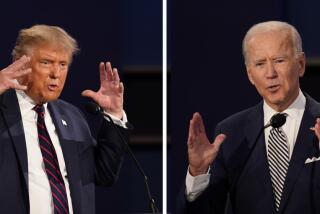It’s Worth Asking if Dukakis Would Tilt Greek-Turkish Equation
- Share via
If elected, Michael S. Dukakis will be the first Greek-American to become President --a prospect that is causing much excitement in Greece.
His breakthrough victories in the Democratic primaries were celebrated by much honking of horns around the Acropolis, and they stirred special pride in the village of Pelopi, where the Dukakis family lived before leaving for America.
A recent dispatch from Pelopi told how the townspeople already are raising money to fly en masse to Washington to help celebrate the anticipated Dukakis victory. A village street has been renamed for him, and the town fathers are planning to give him a plot of land on which to build a home and grow watermelons.
It’s a heartwarming story--one that does Dukakis no harm among millions of voters who are themselves immigrants or the children of immigrants.
What remains unclear, however, is whether Dukakis’ Greek connection would help or hinder his conduct of U.S. foreign policy--especially America’s relations with Greece and Turkey--if he is elected. A great deal rides on the answer.
Greece and Turkey have been members of the North Atlantic Treaty Organization since shortly after its inception--and with good reason. If war ever broke out in Europe, the two countries could not escape involvement because of their strategic location between the Mediterranean and Black seas. Anxious to secure passage through the Turkish straits and the Aegean Sea for their own forces and to guard against allied incursions into the Black Sea, the Soviets almost certainly would invade Greece and Turkey.
The United States is pledged to go to their aid in such an event. Toward that end, as well as to help safeguard Western interests in the area generally, we maintain important military bases in both countries. Turkey could be an especially valuable staging area for America’s Rapid Deployment Force if its presence were required in the oil-rich Persian Gulf area.
Unfortunately, Greece and Turkey behave less as allies than as enemies. Their quarrel over Cyprus and the sea and air boundaries around the Aegean Islands prevents their military cooperation within NATO and feeds frictions with Washington over base rights in both countries.
U.S. relations with Greece have been especially dicey since 1981, when Prime Minister Andreas Papandreou came to power promising to take Greece out of NATO. Papandreou, a Harvard Ph.D., has since soft-pedaled that threat, but delights in anti-American, pro-Soviet rhetoric. He has opposed NATO’s deployment of Pershing and cruise missiles, denounced Poland’s Solidarity movement as a “negative and dangerous force” and charged that the South Korean airliner that was shot down by the Soviets in 1983 was on a spy mission. He also has displayed a relaxed attitude toward anti-Western terrorism.
As for the U.S. bases in Greece, Papandreou has put Washington on notice that they must be removed if a new base agreement is not negotiated by July 31.
Greek demands are said to include not only new military aid but also a U.S. pledge to prevent Greece from being attacked by Turkey. Such a commitment would be deeply resented by Turkey, which has its own grievances against Washington.
The Greeks and Turks, having come perilously close to war 15 months ago, are now trying to moderate their differences in a series of summit meetings. The fact of high-level talks is encouraging. But neither side can make concessions on Cyprus or national boundaries in the Aegean without setting off violent reaction at home. Turkish Prime Minister Turgut Ozal blames Turks opposed to detente with Athens for a recent attempt on his life.
It’s a safe bet that Greek-Turkish friction, and the headaches that it creates for Washington, will still be around when the next President takes office. If the President is Dukakis, his very presence in the Oval Office conceivably will have a soothing effect on U.S.-Greek relations by making anti-Americanism less popular in Greece.
But it is also possible that Papandreou will expect Dukakis to tilt U.S. policy clearly toward Greece and against Turkey. If such a tilt in fact occurred, there is a real danger that Turkey would pull out of the alliance, with disastrous consequences for Western interests.
Much depends on whether the Greek-American community itself would press for a pro-Greek tilt by Dukakis or would help him resist any such pressure from Athens.
Dukakis has leaned heavily on the Greek-American community for campaign funds and is beholden. He is described as still close to his old parish priest, who is now the Greek Orthodox archbishop of North and South America.
An adviser to Dukakis scoffs at any notion that, if elected, he would be a knee-jerk advocate of Greek causes. And Peter Pappas, the editor of the Greek-American newspaper, has in fact criticized Dukakis for taking too little interest in Greece’s problems with Turkey. He complains that Dukakis never stressed his immigrant roots until he started running for President.
Still, the question of whether Dukakis would pursue an evenhanded policy toward Greece and Turkey is a legitimate issue. Curiously, it has hardly been mentioned in the campaign.
More to Read
Sign up for Essential California
The most important California stories and recommendations in your inbox every morning.
You may occasionally receive promotional content from the Los Angeles Times.













